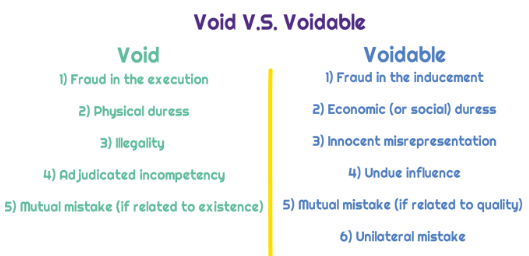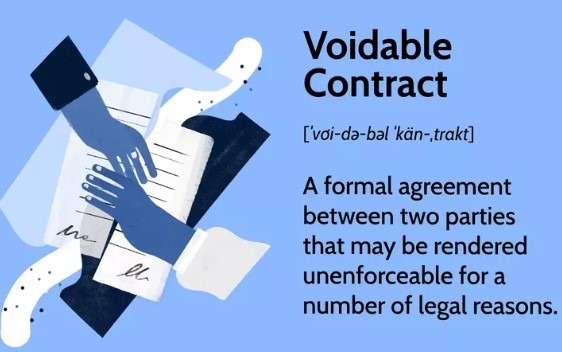Are you unsure about the validity of a contract and want to know what makes it null or void? The fact is, a contract can become unenforceable due to several reasons such as illegal terms, lack of capacity, or being unclear.
This blog will guide you through understanding the elements of a valid contract and identifying factors that can render it illegitimate. Keep reading to gain insights into this essential aspect of law!
Key Takeaways
- A valid contract must have elements such as capacity, offer, acceptance, legality, consideration, and mutuality.
- Void contracts are agreements that have no legal effect from the start due to factors like illegal activities or lack of mutual consent.
- Voidable contracts are initially valid but can be canceled if certain conditions occur, such as fraud or undue influence.
- Contracts can become null and void for various reasons including engaging in illegal activities, unclear agreements, incomplete contracts, parties lacking capacity, and mistakes.
Elements of a Valid Contract
A valid contract must have the elements of capacity, offer, acceptance, legality, consideration, and mutuality.
Capacity
Capacity refers to a party’s ability to understand and meet the requirements of a valid contract. All parties in a contractual agreement must possess this important element, otherwise, their contracts can become null and void.
For instance, individuals under legal age or those facing mental incapacitation may not have the required capacity to enter into lawful agreements. It doesn’t just touch on age or mental state; business entities need proper authorization for their representatives to sign binding contracts too.
Therefore, understanding and confirming each party’s capacity is crucial when forming any agreement.
Offer
An offer sets the stage for a valid contract in contract law. It involves one party, known as the offeror, proposing terms to another person or entity, referred to as the offeree. The offer needs to be clear and specific in outlining what each party is obligated to do.
It’s crucial for an agreement to have a solid offer so that misunderstandings can be prevented down the line. For example, if you’re selling your car, your advertised price can serve as an implied offer.
Once someone accepts your price (either verbally or through action), it heightens into a legitimate agreement with legal effect—assuming all other elements of a valid contract are present.
Acceptance
Acceptance in a contract emerges when one party agrees to the terms and conditions set by another. This key element solidifies the mutual consent required for a valid agreement. It often takes the form of an explicit affirmation, but it can also be implied through actions or conduct suggesting approval.
Whether spoken or written, acceptance signals that all parties fully understand and comply with their contractual obligations. Misunderstandings during this stage can lead to contractual disputes or may render a contract void from its creation, emphasizing the importance of clear communication in accepting terms.
Legality
Legality is a crucial element of a valid contract. In order for a contract to be enforceable, it must have a legal purpose. This means that the terms and conditions stated in the agreement should not involve any unlawful or illegal activities.
For example, contracts related to illegal drugs or criminal actions would be considered null and void from the beginning. The legality requirement ensures that agreements are based on lawful intentions and promotes fairness in contractual relationships.
Consideration
Consideration is a crucial element in the formation of a valid contract. It refers to something of value that is exchanged between parties involved in a contract. This can include money, goods, services, or even promises to do or not do something.
Consideration ensures that both parties are giving and receiving something in return for entering into the agreement. Without consideration, a contract may be deemed unenforceable.
In other words, if one party fails to provide consideration, the other party would have no legal remedy if the contract is breached. It is essential for both parties to understand their obligations and ensure that consideration exists for a contract to be valid.
Mutuality
Both parties involved in a contract must have mutual consent for it to be valid. This means that both parties willingly agree to the terms and conditions of the agreement without any undue influence or coercion.
Mutuality ensures that there is a meeting of minds, where both parties understand and accept what is being agreed upon. Without mutuality, one party may claim that they did not truly agree to the contract, which can lead to disputes and potentially render the contract null and void.
It’s important for all parties involved in a contract to have a clear understanding of their rights and obligations before entering into any agreement.
Difference between Void and Voidable Contracts

Void contracts are agreements that have no legal effect from the moment of creation, while voidable contracts are initially valid but can be unenforceable if certain conditions occur.
Void Contracts
Void contracts are agreements that have no legal effect right from the start. These contracts lack certain essential elements required for a valid contract to exist. They are considered invalid and unenforceable by law.
A void contract is essentially treated as if it never existed, with no obligations or rights attached to either party involved. This can occur in situations where the agreement breaches public policy, involves illegal activities, or lacks mutual consent between the parties.
In such cases, it is crucial to seek legal advice and understand your rights and responsibilities when dealing with void contracts.
Voidable Contracts

A voidable contract is a legal agreement that can be considered valid and binding at first, but has the potential to be canceled or annulled by one party. This typically occurs due to certain factors such as fraud, undue influence, misrepresentation, or if one of the parties involved lacks capacity to enter into a contract.
In such cases, the affected party may have the option to either affirm the contract and proceed as originally intended or choose to void it altogether. It’s important for individuals to understand their rights and obligations when dealing with voidable contracts in order to protect themselves in legal agreements effectively.
You can also checkout a list of Contract management software which helps mitigate risks of default.
Reasons for a Contract to be Null and Void
A contract can be deemed null and void for various reasons, including engaging in illegal or unlawful activities, entering into uncertain or confusing agreements, having an incomplete contract, involving parties with incapacity, and making mistakes during the creation of the contract.
Illegal and Unlawful Reasons
Contracts can be rendered null and void if they are based on illegal or unlawful reasons. This means that if the purpose of a contract is to engage in an activity that is against the law, the contract cannot be enforced by the courts.
For example, if two parties agree to commit a crime together and create a contract outlining their plan, that agreement would be considered invalid from the outset. It is important to ensure that any contracts entered into adhere to legal requirements to avoid complications down the line.
Uncertain and Confusing Agreements
Uncertain and confusing agreements can render a contract null and void. When the terms of a contract are ambiguous or unclear, it becomes challenging for both parties to understand their obligations and responsibilities.
This lack of clarity can lead to disputes and conflicts later on, making the agreement unenforceable. It is essential for contracts to be drafted in clear and concise language, with specific terms that leave no room for interpretation.
By ensuring that all parties have a clear understanding of the agreement’s terms, uncertainties and confusion can be minimized, increasing the likelihood of a valid and enforceable contract.
Incompleteness of the Contract
An incomplete contract fails to clearly define the essential terms and conditions of an agreement, making it null and void. When crucial details such as payment terms, delivery dates, or scope of work are missing from a contract, it becomes impossible for both parties to fulfill their obligations.
This lack of clarity can lead to misunderstandings and disputes that cannot be resolved due to the incompleteness of the contract. Parties involved in a contractual agreement must ensure that all essential elements are clearly stated and agreed upon to avoid rendering the contract invalid.
Incapacity of a Party
If one party involved in a contract lacks the legal capacity to enter into an agreement, the contract may be considered null and void. Legal capacity refers to a person’s ability to understand and comprehend the terms and consequences of a contract.
This can include minors, individuals with mental disabilities, or those who are under the influence of drugs or alcohol. Contracts entered into by parties lacking capacity are generally unenforceable because they do not meet the requirement of mutual consent.
It is crucial for all parties involved in a contract to have the legal capacity necessary to ensure its validity and enforceability.
Mistake
Mistakes can render a contract null and void. If there is a mistake in the terms or conditions of the agreement, it may affect its legal validity. For example, if both parties mistakenly sign different versions of the contract with conflicting provisions, it could invalidate the entire agreement.
Similarly, if one party makes an honest mistake regarding a material fact that significantly impacts the contract’s purpose, it can also make the contract invalid. Mistakes can undermine mutual consent and clarity in contractual obligations and cause disputes between parties.
Moreover, mistakes can occur due to unintentional errors or misunderstandings during negotiations or drafting stages. These mistakes might include typographical errors in numbers or dates, incorrect identification of parties involved, or misunderstanding key terms within the agreement.
How to Terminate an Agreement

To terminate an agreement, review the contract carefully, identify termination clauses, communicate the termination to the other party, and seek legal advice if necessary.
Properly review the contract
To ensure the validity of a contract, it is essential to thoroughly review its terms and conditions. Carefully examining the contract allows you to understand your rights and obligations before entering into an agreement.
Look for any ambiguities, unclear language, or missing information that could potentially render the contract void or unenforceable. By conducting a detailed review, you can identify any potential issues or red flags and seek legal advice if necessary.
Taking the time to properly review the contract can help protect your interests and avoid future disputes or complications.
Identify termination clauses
Identifying termination clauses is an essential step in effectively terminating an agreement. Termination clauses outline the specific conditions and procedures for ending a contract.
By carefully reviewing the contract, you can identify these clauses and understand your rights and obligations when it comes to termination. These clauses may include provisions relating to notice periods, penalties, or other requirements that must be fulfilled before terminating the agreement.
Being aware of these clauses will help you navigate the process smoothly and ensure that you comply with any necessary steps outlined in the contract.
Communicate termination to the other party
To terminate an agreement, it is important to communicate the termination to the other party involved. This can be done verbally or in writing, depending on what is required by the contract.
By effectively communicating the termination, both parties will have a clear understanding that the agreement is being terminated and can begin taking appropriate actions as necessary.
It ensures transparency and helps prevent any misunderstandings or disputes that may arise from a lack of communication about termination.
Consider legal advice if needed
If you find yourself in a situation where your contract is null and void, it may be wise to seek legal advice. Consulting with a lawyer who specializes in contract law can provide you with the guidance and expertise needed to navigate the complexities of your specific situation.
They can help you understand your rights and obligations, as well as any potential legal remedies available to you. Having proper legal representation ensures that your interests are protected and increases your chances of achieving a favorable outcome.
Importance of Contractual Knowledge and Expertise
Hiring a lawyer for contract issues can provide valuable legal support and ensure that contracts are properly drafted, reviewed, and understood. Legal expertise in contract law can help individuals protect their rights, navigate disputes, and avoid potential pitfalls in the future.
Hiring a lawyer for contract issues
Hiring a lawyer for contract issues is important. Here are reasons why:
- They have expertise in contract law
- They can review and negotiate contracts on your behalf
- They will ensure that the contract is legally binding and enforceable
- They can provide advice on your rights and obligations under the contract
- They will represent you in case of contractual disputes or breaches
- They can help you understand the legal implications of the contract
- They will help protect your interests and minimize risks
Benefits of legal support for contracts
Legal support for contracts offers several benefits to ensure the validity and enforceability of agreements. These benefits include:
- Expertise: Attorneys specializing in contract law possess in-depth knowledge and expertise to draft, review, and negotiate contracts. They understand legal terminology, potential risks, and best practices to protect your interests.
- Clarity: Lawyers can help clarify complex contractual terms, ensuring that all parties have a clear understanding of their rights and obligations. This reduces the likelihood of misunderstandings or disputes in the future.
- Risk mitigation: Legal professionals can identify potential risks or loopholes in contracts and suggest ways to mitigate them. By addressing these issues proactively, you can avoid costly legal battles and protect yourself against unforeseen liabilities.
- Compliance with laws: Contract lawyers stay updated on relevant laws and regulations that may impact your agreement. They can guide you on ensuring compliance, avoiding illegal clauses, or incorporating necessary legal requirements into your contracts.
- Negotiation tactics: Hiring a lawyer gives you access to skilled negotiators who can advocate for your interests during contract negotiations. They can help secure favorable terms while balancing the needs of all parties involved.
- Dispute resolution: In case of contractual disputes, a lawyer can represent you in negotiations or court proceedings, increasing the likelihood of achieving a favorable outcome. They have experience with dispute resolution techniques such as mediation or arbitration.
- Peace of mind: Having legal support provides peace of mind by knowing that your contract is legally sound and adequately protects your rights. This allows you to focus on your business objectives without worrying about potential legal pitfalls.
Conclusion
Understanding what makes a contract null and void is crucial for anyone involved in legal agreements. By knowing the elements of a valid contract and the reasons that can render it invalid, individuals can protect themselves from entering into unlawful or unenforceable agreements.
Termination of an agreement should be done carefully following proper review, identification of termination clauses, communication with the other party, and seeking legal advice when necessary.
Having contractual knowledge and access to legal expertise ensures that contracts are legally binding and minimizes the risks of breaches or disputes.
FAQs
What can make a contract null and void?
A contract can be rendered null and void if there is coercion, fraud, mistake, illegality, or lack of capacity of one party involved.
Can a verbal agreement be considered null and void?
Yes, a verbal agreement can be considered null and void if it does not meet the legal requirements for enforceability or if it falls under specific exceptions where written contracts are required by law.
Does a contract become null and void if one party breaches it?
No, a contract does not automatically become null and void if one party breaches it. The non-breaching party may have legal remedies available to seek damages or specific performance.
Can an oral modification render a written contract null and void?
No, an oral modification typically cannot render a properly executed written contract null and void unless the original contract allows for such modifications or both parties agree in writing to modify the terms.
Are there any circumstances where a court can declare a contract as null and void?
Yes, courts have the authority to declare contracts as null and void under certain circumstances involving unconscionability (extreme unfairness), public policy violations, or when one party lacks mental capacity at the time of entering into the agreement.





